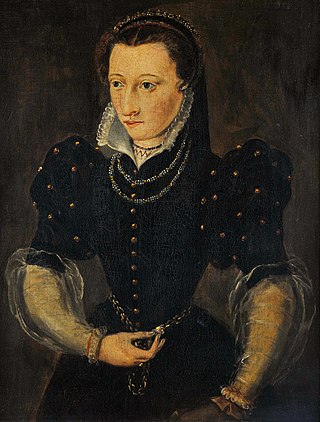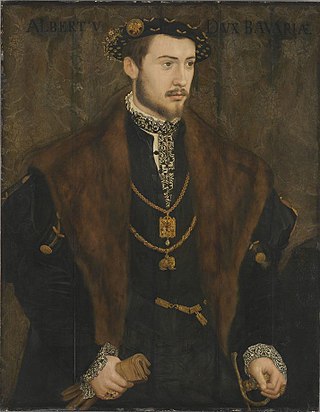
Jacques Gruet (died July 26, 1547) was a poet put to death in Geneva during John Calvin's lifetime in the 16th century.

Jacques Gruet (died July 26, 1547) was a poet put to death in Geneva during John Calvin's lifetime in the 16th century.
Jacques Gruet was the son of Humbert Gruet, a notary public of Geneva. Humbert died in 1513, and Gruet's mother died after 1522. He also had a sister, Hugonine, who died in 1538. Gruet's business contacts included André Philippe, a noted opponent of Calvin and the son of Jean Philippe, who had been executed in 1540. At the time of his death, Gruet lived in a large house at Place du Bourg-de-Four near Porte du Chastel and St. Pierre Cathedral. [1]
In Geneva, he was influenced by Ami Perrin and Françoise Favre, and opposed to John Calvin's influence in the city and defied conservative laws in the city. He was suspected of attempting to poison theologian Pierre Viret in 1535 [2] and was once prosecuted for dancing. He was known for his love of wine and for wearing chausses chapplée, a style of trousers that scandalized the city with their shortness. [3] [4] He may have served as a monk earlier in his life. [5]
Gruet was seen as a leader of opposition to Calvin's leadership, although he may not have been a member of the main opposition associations, "The Patriots" and the "spirituals". [3] This group included Gruet, Perrin, the Favre brothers, Claude Franc, François Berthelier, and André Philippe. [6]
On June 27, 1547, a threatening note was found on St. Pierre Cathedral. [3] The note threatened Calvin and fellow minister Abel Poupin, referring to the recent stabbing of another religious leader, Verli de Fribourg. The next day, Gruet was accused and arrested. [1] Gruet's home was searched and papers were found which showed Gruet's opposition to the religious leaders of the town. [3] On July 2, 1547, Calvin wrote a letter to his friend Pierre Viret in which Calvin stated that although many suspected Gruet of writing the note, the note was not in Gruet's hand. [7] Calvin further stated that the search of Gruet's papers uncovered a number of documents which Calvin described as follows: "a humble petition which he had designed to present to the people in the Assemblies, in which he contended that no offence should be punished by the laws but what was injurious to the state; for that such was the practice of the Venetians, who were the highest authority in the matter of government; and that in truth there was danger with this city submitted to be ruled by the brain of one man of melancholy temperament, of a thousand citizens being destroyed in the event of any outbreak. Letters were also found, clearly written to Andre Philippe, and to others. In some he named me; at other times, he had enveloped me in figures of speech, so clumsily contrived, however, that one could lay his finger on what he meant to conceal. There were, besides, two pages in Latin, in which the whole of Scripture is laughed at, Christ aspersed, the immortality of the soul called a dream and a fable, and finally the whole of religion torn in pieces. I do not think he is the author of it; but as it is in his handwriting, he will be compelled to appear in his defence, although, it may be, that he has himself thrown into the form of a memorandum according to the turn of his own genius, what he heard from others;" [8] Imprisoned for a month, he was tortured and confessed to libeling Calvin, but did not name any accomplices. [2] The day of his death, Gruet was marched from his prison at l'Eveche to the Hôtel de Ville, a route which brought him past his own home. [3] He was beheaded on July 26, 1547. [2]
In 1549, [1] a book with anti-Christian writings by Gruet was found in Gruet's house. While Calvin himself had not taken direct part in Gruet's trial and execution, he was asked what to do about this book, and together with Geneva religious leaders, it was decided that the book should be burned. The public burning took place on May 25, 1550. [9] [5]

John Calvin was a French theologian, pastor and reformer in Geneva during the Protestant Reformation. He was a principal figure in the development of the system of Christian theology later called Calvinism, including its doctrines of predestination and of God's absolute sovereignty in the salvation of the human soul from death and eternal damnation. Calvinist doctrines were influenced by and elaborated upon the Augustinian and other Christian traditions. Various Congregational, Reformed and Presbyterian churches, which look to Calvin as the chief expositor of their beliefs, have spread throughout the world.

Theodore Beza was a French Calvinist Protestant theologian, reformer and scholar who played an important role in the Protestant Reformation. He was a disciple of John Calvin and lived most of his life in Geneva. Beza succeeded Calvin as the spiritual leader of the Republic of Geneva.

François Hotman was a French lawyer and writer, associated with the legal humanists and with the monarchomaques, who struggled against absolute monarchy. His first name is often written 'Francis' in English. His surname is Latinized by himself as Hotomanus, by others as Hotomannus and Hottomannus. He has been called "one of the first modern revolutionaries".

Loys "Louis" Bourgeois was a French composer and music theorist of the Renaissance. He is most famous as one of the main compilers of Calvinist hymn tunes in the middle of the 16th century. One of the most famous melodies in all of Christendom, the tune known as the Old 100th, to which the Protestant doxology is often sung, is commonly attributed to him.

Pierre Viret was a Swiss Reformed theologian, evangelist and Protestant reformer.

Idelette Stordeur de Bure Calvin (1500–1549) was the wife of the French reformer John Calvin.
Protestant Reformers were theologians whose careers, works and actions brought about the Protestant Reformation of the 16th century.

The reformed confessions of faith are the confessional documents of various Reformed churches. These express the doctrinal views of the churches adopting the confession. Confessions play a crucial part in the theological identity of reformed churches, either as standards to which ministers must subscribe, or more generally as accurate descriptions of their faith. Most confessions date to the 16th and 17th century.

Jacopo Sadoleto was an Italian Catholic cardinal and counterreformer noted for his correspondence with and opposition to John Calvin.
Corderius was a French-born theologian, teacher, humanist, and pedagogian active in Geneva, Republic of Geneva. He taught at the School of Lausanne, where he was a director.

Albert V was Duke of Bavaria from 1550 until his death. He was born in Munich to William IV and Maria Jacobäa of Baden.
Antoine Froment (1508–1581) was a Calvinist Protestant reformer in Geneva. Froment is best remembered for his role in initiating and solidifying the Reformation in Geneva along with William Farel and John Calvin. His role in these events, however, is smaller compared to the tremendous accomplishments of Farel and Calvin.
Jérôme-Hermès Bolsec, also known as Hieronymus Bolsec was a French Carmelite theologian and physician, who became a Protestant and controversialist, later returning to the Catholic Church.

Immanuel Tremellius was an Italian Jewish convert to Christianity. He was known as a leading Hebraist and Bible translator.
Ami Perrin was a Genevan leader of the "Libertins" party and one of the most powerful figures in Geneva in the 16th century as chief opponent of religious reformer John Calvin's rule of the city.
Augustin Marlorat du Pasquier was a French Protestant reformer, executed on a treason charge.
Jean Crespin was a French Protestant lawyer who became a significant printer and martyrologist in Geneva.

Théodore Tronchin (1582–1657) was a Genevan Calvinist theologian, controversialist and Hebraist.

Benoît Textor or Tessier Latinized as Benedictus Textorius Segusianus was a French physician and naturalist. He was a friend of John Calvin and Pierre Viret. He took an interest in the study of birds and compiled a work along with his son Claude Textor (1538–c.1576) and Jean Tagaut, the son of his teacher.